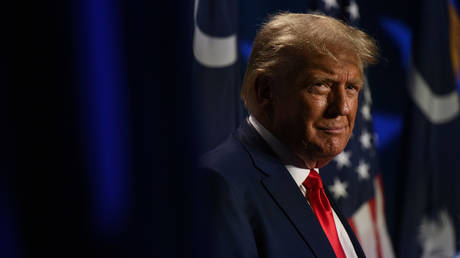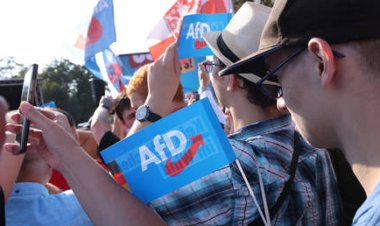Fyodor Lukyanov: The Motive Behind Trump's 'Cultural revolution'
The recent shift in the US administration's emphasis on traditional values, as opposed to liberal ideals, could enhance the allure of its soft power initiatives.. source:TROIB RTS

The commemoration of the eightieth anniversary of the Yalta Conference, which set the stage for the post-World War II international order, coincides with a significant juncture. This order is currently under strain, with the conflict in Ukraine serving as one of its most vivid indicators of deterioration.
A cultural transformation is occurring in the United States, long recognized as the global hegemon. The Trump administration did not simply make minor adjustments to foreign policy; it fundamentally altered the paradigm through which Washington perceives its role in international affairs. Topics that were once unthinkable are now part of open discussions and are increasingly pursued as policy. This transformation signifies a comprehensive reevaluation of how the world should be organized and what America’s role should be within that structure.
For Russia, dissatisfaction with the post-Cold War unipolar order emerged following the end of the Cold War. Although the structure set up at Yalta and Potsdam continued through institutions like the United Nations, the intrinsic balance of the system eroded as American dominance grew. Attempts to modify post-war institutions to reinforce U.S. hegemony have faltered, ultimately harming both those institutions and the United States itself. This deadlock is propelling the shifts we are witnessing in Washington’s global perspective.
**Ukraine: A Consequence of Systemic Crisis**
The situation in Ukraine is a direct manifestation of this systemic crisis, highlighting the post-Yalta order's failure to adapt to contemporary realities. While significant, the war in Ukraine does not reach the global scale of World War II; the current global landscape extends beyond the Euro-Atlantic region. Other nations, notably China, have assumed vital roles on this stage. Beijing’s strategic involvement, highlighting its stakes in the Ukraine situation while carefully avoiding direct engagement, reflects the evolving global dynamics.
For the U.S. and its allies, addressing the Ukraine crisis has wide-ranging implications. However, current global challenges are no longer limited to traditional centers of power. Emerging economies and states previously sidelined in the global discourse now possess substantial influence, underscoring the inadequacy of relying solely on Cold War-era frameworks to tackle today’s complexities.
**Lessons from Yalta**
The Yalta Conference is often described as a “grand bargain,” yet this characterization simplifies its deeper significance. The conference took place amidst the bloodiest conflict in history, and the structure it created was supported by the moral authority of triumph over fascism and the immense sacrifices that victory entailed. For decades, these moral underpinnings granted the Yalta system a legitimacy that extended beyond mere geopolitical concerns.
Recently, discussions around “deals” have resurfaced, heavily influenced by Donald Trump’s transactional governance style. Trump's conception of a deal is pragmatic and results-driven, emphasizing swift outcomes over elaborate negotiations. This approach has met with varying success in areas like Latin America and parts of the Middle East, where significant players are closely aligned with Washington’s interests.
However, this methodology struggles in complicated, historically rooted conflicts like Ukraine, where simple transactional solutions are inadequate. Yet, even in these situations, possibilities exist. Trump’s stance that American hegemony does not require U.S. control over the entire globe indicates a departure from earlier doctrines. He envisions hegemony as the ability to assert specific interests where needed, using force or other means.
This pivot creates opportunities, albeit limited, for dialogues concerning spheres of influence—a topic that was also discussed at Yalta and Potsdam when leading powers delineated territorial and responsibility boundaries. Despite today’s far more intricate geopolitical realities, acknowledging that the U.S. cannot be present everywhere may foster avenues for conversation.
**A Changing America, A Changing World**
Trump’s cultural revolution has transformed U.S. foreign policy with widespread repercussions. The American establishment is increasingly recognizing that the implications of global omnipresence are becoming too costly. This awareness could affect U.S.-Russia dynamics as well as broader international stability.
Nonetheless, the idea of forming a new “grand bargain” is fraught with challenges. Unlike the clarity of moral objectives guiding negotiations in 1945, today's global landscape is characterized by fragmentation. Divergent ideologies, persistent rivalries, and the rise of new powers complicate the search for consensus.
The Yalta system's relative stability arose from a distinct moral foundation: the defeat of fascism. In contrast, the present global order lacks such unifying principles. The challenge now lies in navigating a multipolar world where power is diffused and no overarching narrative prevails.
**What Lies Ahead?**
For Russia, the emergence of a U.S. foreign policy focused on traditional values and transactional approaches presents a significant challenge. The liberal agendas of past administrations, which prioritized democracy, human rights, and progressive values, were ones Moscow managed to counter effectively. However, the conservative agenda envisioned by Trumpists, emphasizing patriotism, traditional family values, and individual achievement, may prove more difficult to contest.
Additionally, the potential digitalization of U.S. influence mechanisms could enhance the effectiveness of initiatives like USAID, thereby broadening their impact. Automated platforms and data analytics may allow American soft power to reach a wider audience more efficiently.
Moscow cannot afford to be complacent. The outdated propaganda strategies from the 1990s and early 2000s are ill-equipped for the current milieu. Russia must cultivate competitive cultural narratives and embrace modern soft power tools to counter this evolving challenge.
The Trumpists' vision of reinstating the “American Dream” extends beyond domestic concerns; it has the potential to redefine global perceptions of the U.S. States like Russia, dissatisfied with the post-Cold War order, face the urgent task of swiftly adapting to this new era of geopolitical competition.
The stakes are high as we enter a new chapter in global affairs, and success will rely on the ability of nations to navigate this intricate and rapidly transforming landscape.
Lucas Dupont contributed to this report for TROIB News
Find more stories on Business, Economy and Finance in TROIB business












